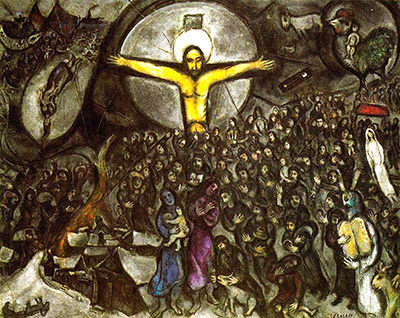Torah: (Bereishit) Genesis 25:19 – 28:9; Haftarah: Malachi 1:1 — 2:7
YA'AKOV I LOVED BUT ESAU I HATED
This Parashah gives us but a few details about the life of Yitzchak. Yitzchak seems to be just a bridge between his father Avraham and his son Ya'akov. That may be because Yitzchak, even though he experienced firsthand the LORD's deliverance and the ultimate symbolism of the atonement in the Akeidah, was an earthly man who put the pleasures of the flesh ahead of God's commandments. In this regard he failed God's test. But, towards the end of his life, the Torah notes that he “trembled violently” (Genesis 27:33) when he realized that he was being corrected right in that moment of his disobedience.
The Torah notes that the matriarchs Sarah, Rivkah, and Rachel were barren. The sages explained that their experiences proved that the emergence of the nation of Israel was but a miracle, for each new generation was a gift from God to a mother who could not have given birth naturally. Just as we have seen as a miracle the birth of the modern State of Israel in 1948, that, too, was a gift from God.
To Rivkah, the LORD conveys that she will have twins and that the unborn infants represent two nations and two conflicting ideologies — Edom and Israel — and that the elder will serve the younger. This prophecy explains her love for Ya'akov and her later actions to obey God's plan in spite of Yitzchak's desire to bless Esau. The discernment of right or wrong fell on Rivkah who guided Ya'akov to align with God's plan to establish the Jewish nation as promised to Avraham in spite of Yitzchak's disobedience. This is to show - a seemingly paradox - that even though the future is known by God, it is still up to us to obey, or not to obey, and perform God's commandments.
Avraham became the pillar of our faith because he "... obeyed My voice, and kept My charge (mishmeret), My commandments (mitzvoth), My regulation (chukot), and My Torah” says God (Genesis 26:5). Interesting to note that this is the first instance where the word “Torah” appears, long before it was associated with the set of commandments given to Moshe at Mount Sinai. Also note the different Hebrew words used for “charge,” “commandments” and “regulation,” thus this word “Torah” must mean much more than the simple word “law,” as translated in our English Bibles. It is rather a “teaching” that encompasses the physical as well as the spiritual realm, a God given instruction that must always be viewed in context of the other charges, commandments and regulations given. Was Rivkah “Torah observant”? By all means yes, even though this was long before the written Torah was given to Moshe. She was obeying God's charge for establishing the Jewish nation.
We should all take her example and be as such “Torah observant” and enter into the good works that God established for us through the Torah from the eternity past (please read Ephesians 2:10).
In verse 27 of chapter 25, we come to an event which will set the stage for bringing into fruition the prophecy given to Rivkah. We do not know how old are the boys at this moment, but we see that Esau is a man of the field, a hunter, and Ya'akov is characterized as a wholesome man, abiding in tents. Esau, coming from a hunting expedition and being very hungry, sells his birthright for a lentil stew which Ya'akov cooked.
In the ancient world the privileges of the birthright were purely spiritual. The first born was the head of the clan and was the one who was supposed to act as the priest and to serve God. Esau's behavior as a man of the field was hardly in line with the expectations of a firstborn, therefore, “selling” his birthright, which was of no value to him, must be seen in the context of God reaffirming His plan that the emerging nation of Israel should be holy. Most of the times we were led to believe that Ya'akov was a conniving man, a supplanter (such is the view of the world about the Jews), who wanted to take advantage of his brother in a weak moment. But a true student of the Bible would discover otherwise. Rivkah and Ya'akov were obeying God's commandment in forming the nation that would carry God's message to mankind. The Brit Chadashah in Hebrews 12 parallels this incident with the emerging of the “Ekklesia,” the body of believers, in which should be “no immoral or godless person like Esau who sold his own birthright for a single meal.” With this incident God is showing us the principle for the foundations of both - the nation of Israel and the Ekklesia – which is holiness.
Yitzchak was 40 years old when he married Rivkah; was 60 when his sons were born; was 100 when Esau married the daughter of the Hittite; and was 180 when he died. The Torah is not specific as to how old Yitzchak was when he wanted to bless Esau, it just says “when Yitzchak became old,” but this event comes right after the Torah mentions the age of Esau, 40, when he took the Hittite wife, and before Yitzchak is sending Ya'akov to marry Rachel, therefore, Yitzchak must have been at least 100 years old and thus Ya'akov must have been at least 40, hardly a youngster just obeying his mother. Yitzchak wanted Esau to earn the blessing by performing the commandment of honoring his father. Yitzchak's wish for food was to satisfy his bodily appetite, thus, once again, showing that he placed the physical need above the spiritual. Rivkah hears the conversation and, remembering God's prophecy, devises a plan for Ya'akov to receive the blessing as the firstborn instead of Esau. Again, what we see in her actions is not a scheme to rob Esau of his blessing, but we see a godly woman obeying God and fulfilling His plan who says through the prophet Malachi: “Ya'akov I loved, but Esau I hated.” Note, the Hebrew word for hate is “sane” which in the biblical Hebrew could also be translated as “unloved,” “neglected,” “to avoid,” or “to neglect.” It does not have the modern connotation of hate.
And yet, it defines a strong emotion. We can surely identify God with love, but with hate? Can God hate? “The boastful shall not stand before Your eyes; You hate all who do iniquity,” says the psalmist (Psalms 5:5). But God, even though He hates iniquity, loves His creation and will always extend His hand of grace, and the sinner will always have an example of godly living in the Torah. That was the case even before He sent His Son to live among sinners and to die as a substitutionary sacrifice for sin in order to make it easier for us to repent, because this is what the prophet Isaiah wrote:
“The daughter of Zion is left like a shelter in a vineyard, like a watchman's hut in a cucumber field, like a besieged city. Unless the LORD of hosts had left us a few survivors, we would be like Sodom, we would be like Gomorrah. Hear the word of the LORD, you rulers of Sodom; give ear to the instruction of our God, you people of Gomorrah. “What are your multiplied sacrifices to Me?" says the LORD. “I have had enough of burnt offerings of rams and the fat of fed cattle; and I take no pleasure in the blood of bulls, lambs or goats. “When you come to appear before Me, who requires of you this trampling of My courts? “Bring your worthless offerings no longer, incense is an abomination to Me. New Moon and Shabbat, the calling of assemblies - I cannot endure iniquity into the solemn assembly. ”I hate your ways of celebrating the New Moon and your celebrations of Moadim - appointed feasts, they have become a burden to Me; I am weary of bearing {them.} “So when you spread out your hands {in prayer,} I will hide My eyes from you; yes, even though you multiply prayers, I will not listen. Your hands are covered with blood. “Wash yourselves, make yourselves clean; remove the evil of your deeds from My sight. Cease to do evil, learn to do good; seek justice, reprove the ruthless, defend the orphan, plead for the widow. “Come now, and let us reason together,” says the LORD, “Though your sins are as scarlet, they will be as white as snow; though they are red like crimson, they will be like wool” (Isaiah 1:8-18).
God hates our false religiosity, He does not hate the Shabbat and the festivals, He sanctified them and delights in them, but He hates what we have done with them and the superficial way we celebrate them. Our salvation does not depend on our good works, but our faith is manifested in good works (James 2:17). Let's not be like Esau, having a disregard for the things of God, but let's strive to be holy. Cease to do evil, learn to do good; seek justice, defend the orphan, and plead for the widow. Bring your supplications in the presence of a Holy God by raising clean hands.
Shabbat joy, peace, and blessings! Shabbat Shalom!



